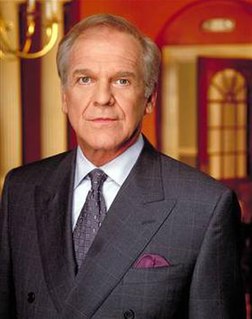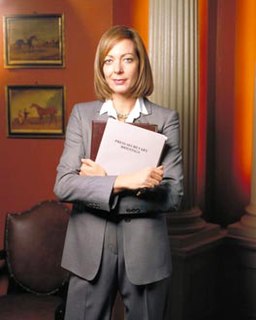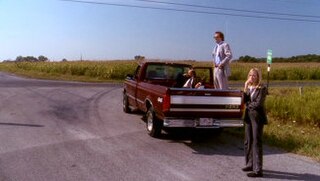
The West Wing is an American serial political drama television series created by Aaron Sorkin that was originally broadcast on NBC from September 1999 to May 2006. The series is set primarily in the West Wing of the White House, where the Oval Office and offices of presidential senior staff are located, during the fictitious Democratic administration of Josiah Bartlet.

Josiah Edward "Jed" Bartlet is a fictional character from the American television serial drama The West Wing, portrayed by Martin Sheen. The role earned Sheen a Golden Globe Award for Best Actor – Television Series Drama in 2001, as well as two SAG Awards.

Leo Thomas McGarry is a fictional character played by American actor John Spencer on the television serial drama The West Wing. The role earned Spencer the Primetime Emmy Award for Outstanding Supporting Actor in a Drama Series in 2002. The character of McGarry, a former Secretary of Labor, begins the series as the White House Chief of Staff. He is President Josiah Bartlet's best friend and a father figure to the senior staff, particularly White House Deputy Chief of Staff Josh Lyman.

Samuel Norman Seaborn is a fictional character portrayed by Rob Lowe on the television serial drama The West Wing. He is Deputy White House Communications Director in the Josiah Bartlet administration throughout the first four seasons of the series.

Joshua Lyman is a fictional character played by Bradley Whitford on the television drama The West Wing. The role earned Whitford the Primetime Emmy Award for Outstanding Supporting Actor in a Drama Series in 2001. For the majority of the series, he is White House Deputy Chief of Staff and Chief Political Advisor in the Josiah Bartlet administration.

Tobias Zachary "Toby" Ziegler is a fictional character in the television serial drama The West Wing, played by Richard Schiff. The role earned Schiff the Primetime Emmy Award for Outstanding Supporting Actor in a Drama Series in 2000. For most of the series' duration he is White House Communications Director. In the final season, Ziegler is involved in a storyline around a leak of classified information, which The New York Timescompared to the leak investigation of the Valerie Plame affair.

Claudia Jean Cregg is a fictional character played by Allison Janney on the television political drama The West Wing. The role proved to be Janney's breakthrough role and earned her unanimous acclaim. For her performance, she received four Primetime Emmy Awards; twice for Outstanding Supporting Actress in a Drama Series and Outstanding Lead Actress in a Drama Series each, as well as four Screen Actors Guild Awards and four nominations for the Golden Globe Award. From the beginning of the series until the sixth season, she is White House Press Secretary in the administration of President Josiah Bartlet. After that, she is Bartlet's chief of staff. The character is inspired by Clinton's press secretary Dee Dee Myers, who served as a consultant to the show. Characterized by manifest integrity, quick witticisms, a fierce intellect, and compassionate stoicism, C.J. is widely acclaimed by critics and political commentators alike as the "most popular White House Press Secretary in recent memory".

Matthew Vincente Santos is a fictional character on the American television show The West Wing, played by Jimmy Smits. Santos' initial appearance in the series was as a Democratic U.S. Representative from Texas's 18th congressional district. He was later elected to succeed Josiah Bartlet as President in the series' seventh and final season. According to David Remnick's biography of Barack Obama, The Bridge, and other news sources, West Wing writer and producer Eli Attie used Obama as a model for Santos.

Arnold Vinick is a fictional character on the television series The West Wing played by Alan Alda. The role earned Alda the Primetime Emmy Award for Outstanding Supporting Actor in a Drama Series in 2006.

Robert Ritchie is a fictional character played by James Brolin on the television serial drama The West Wing. The character is a three-term Governor of Florida and the Republican nominee in the 2002 presidential election.
"Five Votes Down" is the fourth episode of The West Wing. Presidential chief of staff Leo McGarry needs five more House votes to pass a bill restricting the sale of automatic firearms—but the cost might be too high, especially if he has to go to the unpredictable Vice President to help put them over the top. The staff's annual financial disclosure statements prove to be thorny for Toby, whose innocent technology stock purchase last year proved to be wildly profitable, which raises eyebrows due to his association with an expert in the field. In addition, Leo's long hours on the job cause an unforeseen crisis at home, and the President unintentionally mixes up the potent medications he receives for his ailing back.

"Twenty Five" is the 88th episode and the season four finale of the American television series The West Wing. It takes its title from the Twenty-fifth Amendment to the United States Constitution, which deals with the presidential line of succession.

"20 Hours in America" is the two-part fourth season premiere of The West Wing.

The sixth season of the American political drama television series The West Wing aired in the United States on NBC from October 20, 2004, to April 6, 2005, and consisted of 22 episodes.

The first season of the American political drama television series The West Wing aired in the United States on NBC from September 22, 1999 to May 17, 2000 and consisted of 22 episodes.

The second season of the American political drama television series The West Wing aired in the United States on NBC from October 4, 2000 to May 16, 2001 and consisted of 22 episodes.

The fourth season of the American political drama television series The West Wing aired in the United States on NBC from September 25, 2002 to May 14, 2003 and consisted of 23 episodes.

The fifth season of the American political drama television series The West Wing aired in the United States on NBC from September 24, 2003, to May 19, 2004, and consisted of 22 episodes. This was the first season with executive producer John Wells as showrunner after series creator Aaron Sorkin departed the series at the end of the previous season.


















